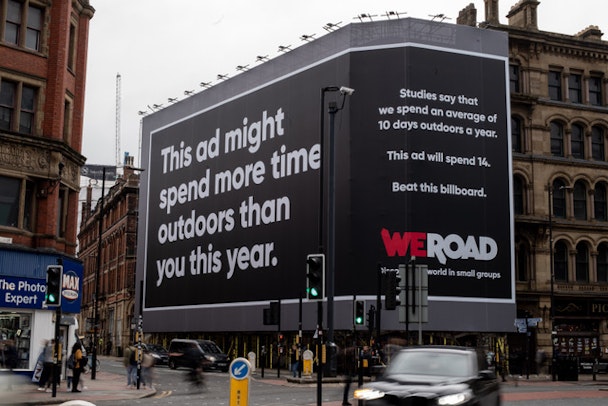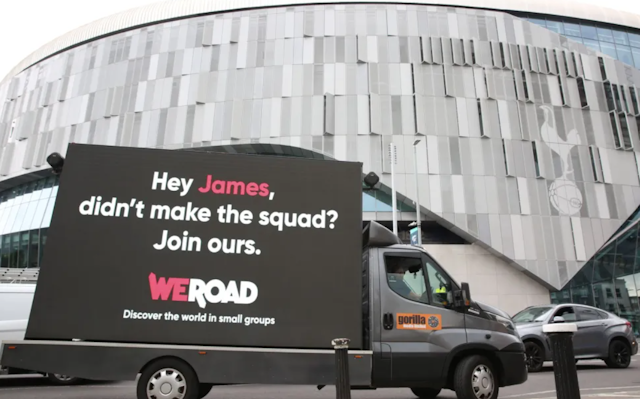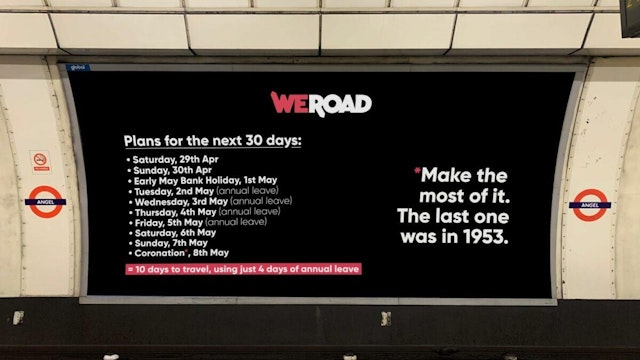Going it alone: WeRoad’s marketing boss on how it stands out in solo travel sector
We catch up with the group travel company’s chief marketing officer, Fabio Bin, as part of The Drum’s Travel & Tourism Focus, finding out more about his strategy for creating viral out-of-home moments.

One of WeRoad's viral billboards / WeRoad
WeRoad is relatively new within the travel sector. The company, which was founded in Milan, Italy, in 2017, places solo travelers, particularly millennials, from around the world together in bucket-list locations. The company’s co-founder and chief marketing officer, Fabio Bin, says what sets the tour operator apart is that it is “obsessed with the alchemy of the groups.”
It has been a case of right place, right time for WeRoad, which also closed an €18m Series B round late last year. According to the Association of British Travel Agents, the number of solo trips has risen from 6% in 2011 to 16% in 2023, with the report stating that people had a “strong appetite to go it alone.”
Destinations covered by the operator include Latin America, Asia and The Middle East, with trips designed in-house and catered to all types of getaways. Each group has a travel coordinator, too, with WeRoad currently employing 2,700 of them across Europe.
For Bin, it’s all about the community feel, which is something the company has tried to get across in its marketing efforts, which have notably ramped up this year – especially in outdoor locations.
Explore frequently asked questions
Being provocative with outdoor ads
“It’s a shortcut to showcase our real adventure to real people,” Bin says, explaining that many of the images it uses come from customers themselves. “People are showing their spontaneity.” For the marketer, the most exciting part of it is revealing WeRoad’s tone of voice.
“Having a blank canvas with a simple statement is really working in every market. Sometimes you have to be a little bit provocative and you always have to be funny. It’s easy to go viral with those types of campaigns.”

In June, when news broke that Jack Grealish and James Maddison would not be joining England at the Euros, a reactive campaign from the company urged the two footballers to join WeRoad’s holiday squad and subsequently went viral. It is all part of a master plan to capture the zeitgeist and be part of momentous occasions.
“We are very fast at coming up with and executing ideas and we usually buy the billboards in last-minute deals. We have the conversation with the providers, buy the spaces and come back with the creative in 24 hours.”
Advertisement
The marketer shares that his team have trained themselves to work at this speed, understanding that the most successful campaigns come from this reactive tactic, particularly on LinkedIn and Instagram.
One billboard campaign in Italy that encouraged Italians to go on holiday ‘intelligently’ by utilizing public holidays to the max caused a stir online and even won an Effie last year. A similar spot on the London Underground outlined how four days of annual leave could give a worker 10 days to travel.

Of course, with any startup business, there are many hurdles to overcome. Bin says one of them has been that because WeRoad started on social media, it is perceived as a digital company, but he is “obsessed with the real-life” aspect of the business.
A decision was made to have multiple social accounts, too, in order to keep up with the nuances, languages and cultural differences of each country, which can be a challenge. When it comes to reacting to local news or a viral meme, for instance, he says: “You have to know exactly what’s happening in the market with a degree of sensitivity. The most challenging part is producing content, preserving the local touch and delivering content at scale in multiple markets.”
Advertisement
Trends in the travel sector
Bin says WeRoad is developing niche travel categories, such as yoga retreats and active sports-focused getaways, which is something he expects to grow this year. There’s also a growing appetite for more luxurious trips.
The marketer hints that he hasn’t seen much real change from some of the bigger, more established brands in terms of marketing communication style, noting that it’s a bit of a “machine” at times and “the same playbook.”
As with every sector, the hot topic is, of course, AI. Bin says that WeRoad is testing out some capabilities to deal with varying customer service needs, but the focus will remain very much on real-world, human-centric experiences.
